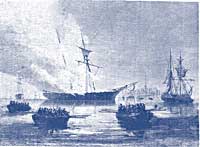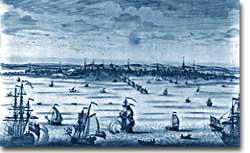7d. Smuggling

The British had an empire to run. The prevailing economic philosophy of seventeenth and eighteenth century empires was called mercantilism. In this system, the colonies existed to enrich the mother country. Restrictions were placed on what the colonies could manufacture, whose ships they could use, and most importantly, with whom they could trade. British merchants wanted American colonists to buy British goods, not French, Spanish, or Dutch products. In theory, Americans would pay duties on imported goods to discourage this practice. The Navigation Acts and the Molasses Act are examples of royal attempts to restrict colonial trade. Smuggling is the way the colonists ignored these restrictions.
Distance and the size of the British Empire worked to colonial advantage. Prior to 1763, the British followed a policy known as salutary neglect. They passed laws regulating colonial trade, but they knew they could not easily enforce them. It cost four times as much to use the British navy to collect duties as the value of the duties themselves. Colonists, particularly in New England, thought nothing of ignoring these laws. Ships from the colonies often loaded their holds with illegal goods from the French, Dutch, and Spanish West Indies. British customs officials earned a modest salary from the Crown. They soon found their pockets stuffed with bribe money from colonial shippers. When smugglers were caught, they were often freed by sympathetic American juries. Smuggling became commonplace. The British estimated that over £700,000 per year were brought into the American colonies illegally.

Boston Harbor, circa 1746, was home to a successful colonial merchant fleet.
As 1776 approached, the tradition of smuggling became vital to the Revolutionary cause. This encouraged ignoring British law, particularly in the harbors of New England. American shippers soon became quite skilled at avoiding the British navy, a practice they used extensively in the Revolutionary War. Soon England began to try offenders in admiralty courts, which had no juries. All attempts to crack down merely brought further rebellion. Woe to the parent who attempts to contain the child who has been allowed to roam free.






